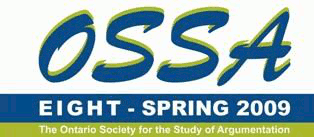
Location
University of Windsor
Document Type
Paper
Start Date
3-6-2009 9:00 AM
End Date
6-6-2009 5:00 PM
Abstract
If we want reasoning to bridge cultural differences, argumentation theory has to show when and why to invoke a “disposition to co-operate.” But it is crucial to re-interpret co-operation as a function of relationships and processes, not as a disposition of individuals. Co-operative relationships and processes can then provide the vital path from individual scepticism to the mutual trust needed to work through difficult disputes.
Creative Commons License

This work is licensed under a Creative Commons Attribution 4.0 International License.
Response to Submission
Catherine E. Hundleby, Commentary on Kloster
Included in
Reason, Trust, and Relationships: Argument and the disposition to co-operate
University of Windsor
If we want reasoning to bridge cultural differences, argumentation theory has to show when and why to invoke a “disposition to co-operate.” But it is crucial to re-interpret co-operation as a function of relationships and processes, not as a disposition of individuals. Co-operative relationships and processes can then provide the vital path from individual scepticism to the mutual trust needed to work through difficult disputes.
